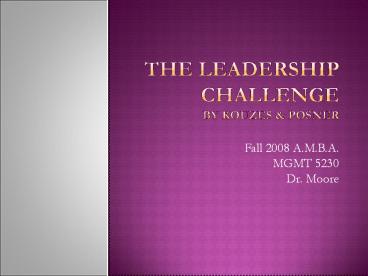The Leadership Challenge By Kouzes - PowerPoint PPT Presentation
Title:
The Leadership Challenge By Kouzes
Description:
Leadership creates change by questioning the status quo ... Leaders set lofty S.M.A.R.T. goals Change must be meaningful and purposeful 360-degree self-actualization ... – PowerPoint PPT presentation
Number of Views:219
Avg rating:3.0/5.0
Title: The Leadership Challenge By Kouzes
1
The Leadership ChallengeBy Kouzes Posner
- Fall 2008 A.M.B.A.
- MGMT 5230
- Dr. Moore
2
Part 1 What Leaders Do and What Constituents
Expect
- 5 Practices of Exemplary Leadership
- Model the Way
- Inspire a Shared Vision
- Challenge the Process
- Enable Others to Act
- Encourage the Heart
3
Part 1 Cont. Credibility is the Foundation of
Leadership
- If you dont believe in the messenger, you wont
believe the message, (p.38) - Is credibility a prerequisite to influence? Is
there a specific level of influence commensurate
with a level of credibility? - Credibility is defined as Honest,
Forward-Looking, Inspiring, Competent,
Intelligent, (p. 30) - Other aspects which augment influence?
- Zone of Indifference?
4
Part 1 Cont. Credibility is the Foundation of
Leadership
- Follower Characteristics
- Lower self esteem, moderate attitudes, good
mood - Leader Characteristics
- Trustworthy, attractive, expertise
- Message
- Non-threatening acknowledging
5
Part 1 Cont. Credibility is the Foundation of
Leadership
- Zone of Indifference
- The range in which attempts to influence a person
will be perceived as legitimate and will be acted
on without a great deal of thought - 2 Aspects 1) Number of people 2) Variety of
topics
6
Part 2 Model the Way
- Leading means you have to be a good example, and
live what you say (p.15) - Words and deeds must be consistent (p.16)
- Leaders are supposed to stand up for their
beliefs, so theyd better have some beliefs to
stand up for (p.15) - To become a credible leader you have to
comprehend fully the deeply held beliefs-values,
principles, standards, ethics, and ideals-that
drive you, (p.48)
7
Part 2 Cont. model the way
- Central Themes in the Values of Successful
Organizations - High performance standards
- A caring attitude about people
- Affective Commitment
- A sense of uniqueness and pride
- Group Cohesion
- Clockwork Snakepit Cultures
- Money Time
8
Part 3 Inspire a Shared Vision
- Shared visions entail the leader being able to
allow followers to see themselves in the picture
of the future that the leader is painting,
(p.117). - Determine Whats Meaningful to Others
- The leader must value and respect the follower
- Reflective Listening
- Be expressive in your communication with others
(Charisma) - How does this relate to the Path-Goal Theory of
Leadership?
9
Part 4 Challenge the Process
- Leadership creates change by questioning the
status quo and choosing to view change as a
challenge rather than a stressful event - Leaders are high in self-efficacy (i.e. they
believe in their ability to create change) - Leaders set lofty S.M.A.R.T. goals
- Change must be meaningful and purposeful
- 360-degree self-actualization
10
Part 4 cont. Challenge the Process
- Leaders are open to external ideas
- Main reason executives fail?
- Leaders take risks
- Learn from small successes and failures
- Do entrepreneurs have low risk aversion?
- Knowledge is power
- Leaders continually learn and grow
- The more youre engaged in learning the more
successful you are at leading, (p.203)
11
Part 5 Enable Others to Act
- Empowerment and the democratic style
- Develops self-determination (autonomy)
- Augments follower competence and confidence
- Gives followers voice
- Followers take accountability
- You cant exhort people to take risks if they
dont also feel safe (p.19) - Allowing people to fail is main strategy to
combat escalation of commitment
12
Part 6 Encourage the Heart
- Leaders gratify followers high-order needs
- Esteem
- Personal creative recognition
- Valence value an individual places on
particular reward - Social, affiliation
- Get to know your followers personally
- LMX
- Achievement
- Pygmalion (p.283)
13
Part 6 cont. encourage the heart
- Celebrate and have fun
- Do fun team-building activities
- Develop relationships
14
Part 7 Leadership for Everyone
- First, lead yourself
- Choose to be a socialized leader everyday (say no
to hubris) - Leadership is learned?
- ABC Theoretical model
- Social learning direct experience

